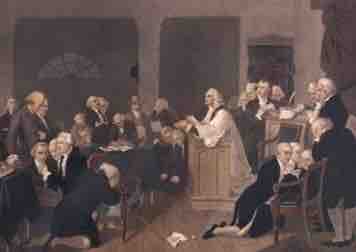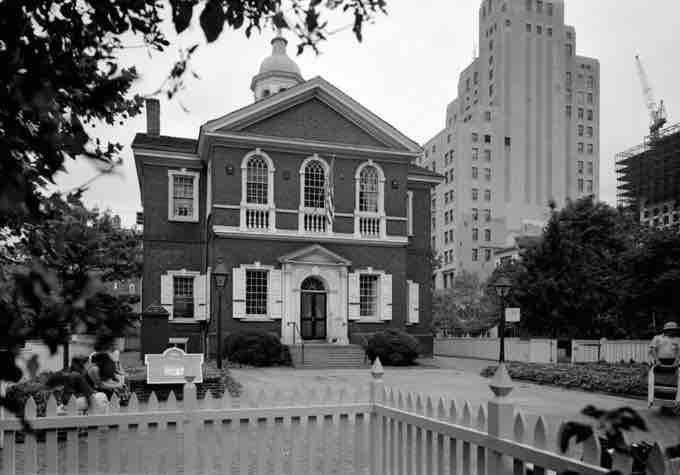Overview
The First Continental Congress was a convention of delegates from 12 British North American colonies that met on September 5, 1774, in Philadelphia, Pennsylvania. It was called in response to the passage of the Coercive Acts by the British Parliament. The Congress was attended by 56 members appointed by the legislatures of 12 of the 13 colonies. The sole exception was the Province of Georgia, which was hoping for British assistance with American Indian conflicts on its frontier.
The Congress met briefly to consider options, including an economic boycott of British trade, rights and grievances, and petitioning King George III for redress of those grievances. The Congress also called for another Continental Congress in the event that their petition was unsuccessful in halting the enforcement of the Coercive Acts. Their appeal to the Crown had no effect, and so the Second Continental Congress was convened the following year to organize the defense of the colonies at the onset of the American Revolutionary War. The delegates also urged each colony to set up and train its own militia.

The Congress
An opening prayer at the First Continental Congress, September 7, 1774, in Philadelphia, Pennsylvania.
The Congress
The need for a Continental Congress grew out of the British blockade at the Port of Boston in response to the Boston Tea Party in 1773. The colonies were united in their effort to demonstrate their authority to Great Britain by virtue of their common causes and through their unity. The delegates organized an economic boycott of Great Britain in protest against the Coercive Acts passed by the British Parliament in 1774, and petitioned the King for a redress of grievances.
Differing Objectives
Nevertheless, their ultimate objectives were not consistent. Pennsylvania and New York had sent delegates with firm instructions to pursue a resolution with Great Britain. While the other colonies all held the idea of colonial rights as paramount, they were split between those who sought legislative equality with Britain and those who instead favored independence and a break from the Crown and its excesses. On October 26, 1774, the First Continental Congress adjourned. They agreed to reconvene in May of 1775, if Parliament still did not address their grievances.
The Continental Association and Petition to the King
The result of the Congress was the Continental Association, which was a system for implementing a trade boycott with Great Britain. The Association aimed to alter Britain's policies toward the colonies without severing allegiance and was fairly successful while it lasted. The articles imposed an immediate ban on British tea and a ban on importing or consuming any goods (including the slave trade) from Britain, Ireland, and the British West Indies to take effect on December 1, 1774. It also threatened an export ban on any products from the American colonies to Britain, Ireland, or the West Indies, to be enacted only if the complained-of acts were not repealed by September 10, 1775. The articles stated that the export ban was being suspended until this date because of the "earnest desire we have not to injure our fellow-subjects in Great-Britain, Ireland, or the West-Indies."
Only one colony failed to establish local enforcement committees; in the others, the restrictions were dutifully enforced (by violent measures, on some occasion). Trade with Great Britain fell sharply, and Parliament responded by passing the New England Restraining Act, which prohibited the northeastern colonies from trading with anyone but Britain and the British West Indies and barred colonial ships from the North Atlantic fisheries. These punitive measures were later extended to most of the other colonies as well.
The Petition to the King was also formed during the First Continental Congress and sent to George III of Great Britain. The petition expressed loyalty to the king and hoped for redress of grievances relating to the Coercive Acts and other issues that helped foment the American Revolution.
Response from London
In London, Parliament debated the merits of meeting the demands made by the colonies. However, it took no official notice of Congress' petitions and addresses. On November 30, 1774, King George III opened Parliament with a speech condemning Massachusetts. At that point, it became clear that the Continental Congress would have to convene once again.

Carpenter's Hall
The First Continental Congress met briefly in Carpenter's Hall in Philadelphia, Pennsylvania, from September 5–October 26, 1774.